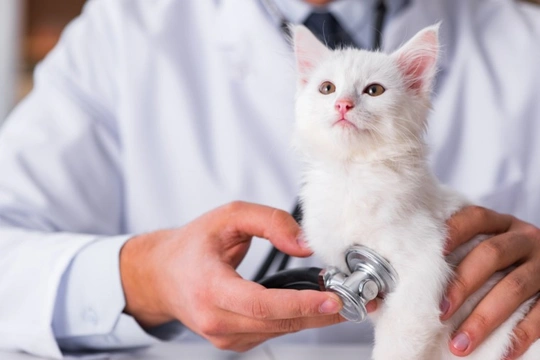
The three most common reasons for cats seeing a vet are preventable
Preventative healthcare is healthcare (or veterinary care specifically, in this case) that is undertaken to prevent or reduce the chances of later sickness. It is designed to pre-empt the onset of health problems and take proactive steps to prevent them from developing, and as you might expect, this is a very good idea!
The vast majority of us take steps to take care of our own preventative healthcare, whether we realise it or not; by means of things like having dental check ups and brushing our teeth, having vaccinations, and trying to avoid gaining too much excess weight.
Preventative healthcare applies to animals as well, however, and yet few cat owners are as responsible about this as they should be; as we revealed earlier on this year with some concerning statistics about how many cat owners have their cats vaccinated, neutered, and so on.
The reasons that cat owners give for neglecting preventative healthcare are varied and rarely valid, but the simple fact is that all too few UK cat owners are vigilant about ensuring they do everything possible to stop their cats getting sick.
Preventive healthcare can help to prevent pain and suffering for your cat, as well as expensive veterinary bills for yourself further down the line; so it is surprising and disappointing to know that the three most common reasons for cats in the UK seeing the vet are all health conditions or problems that are totally preventable.
The Royal Veterinary College determined this after undertaking a large-scale study across 91 veterinary clinics between 2009-2014, to identify how frequently the most common feline disorders were recorded in a random sampling of 3,583 cats out of a total number of 142,586 seen during this time.
The results were recorded in terms of how many cats per thousand were identified to have certain health conditions; and the three most frequently occurring conditions can all be prevented entirely in the vast majority of cases.
These three cat health problems even outstripped issues like heart murmurs and accidental injuries in terms of how often they appear; and this is something that all cat owners should take seriously.
If you’re not investing in your cat’s preventative healthcare, they too might develop one of these conditions, or already be showing symptoms of it; so with this in mind, read on to learn the three most common health conditions vets see in cats, all of which are usually preventable.
Number 1: Periodontal disease
Periodontal disease, also known as gum disease, is a catch-all name given to a collection of health problems that can develop with the teeth and gums if they’re not properly cared for. Periodontal disease can affect people as well as cats, but is less common in people as we brush our teeth and usually visit the dentist regularly.
However, few cat owners brush their cat’s teeth regularly, and many are surprised to learn that this is even a thing, and yet this is something that all cat owners should do a few times a week.
Regular dental check-ups with the vet are important too.
The RVC’s study found that 139.20 out of every 1,000 cats, or well over one in ten, have periodontal disease, which can almost always be prevented with proper dental care.
Number 2: Flea infestation
Flea infestation might not seem like a health condition in and of itself, or at least, not a serious one.
However, a significant number of the UK’s cats have fleas – 79.50 out of every 1,000, in fact, or a shade under one in ten.
Fleas are of course irritating and unpleasant, and can infest your home as well as your cat. Many cat owners wrongly believe their cats are flea-free as they as owners don’t get bitten, and they cannot see fleas when brushing the cat.
However, cat fleas don’t bite humans, and brushes don’t reveal fleas. Unless your cat is regularly treated with a veterinary-approved flea treatment that is properly applied, they probably have fleas!
Long-term flea infestation can cause a very acute health condition in affected cats, which cannot be reversed. This is called flea bite dermatitis, and means that the cat has an acute localised reaction to every single flea bite, resulting in huge irritation, discomfort, and potentially pain, as well as soreness and damage to the skin.
This can be entirely prevented with proper flea treatment throughout the cat’s life.
Number 3: Obesity
Obesity is both a health condition in and of itself, and also the potential catalyst or trigger for a wide and diverse range of secondary health problems that can develop from it, including diabetes.
Cats aren’t as bad at moderating their own food intake as dogs are and aren’t as prone to being overweight, but many cats gain weight as they age, through too many treats and not enough play!
In fact, 66.70 out of every 1,000 cats or over one in twenty are obese, and so, having their health placed at risk of all of the complications this can cause.
All three of these cat health conditions can be prevented for most cats, by some work on the part of their owners; is it time you reviewed your own cat’s preventative healthcare?



